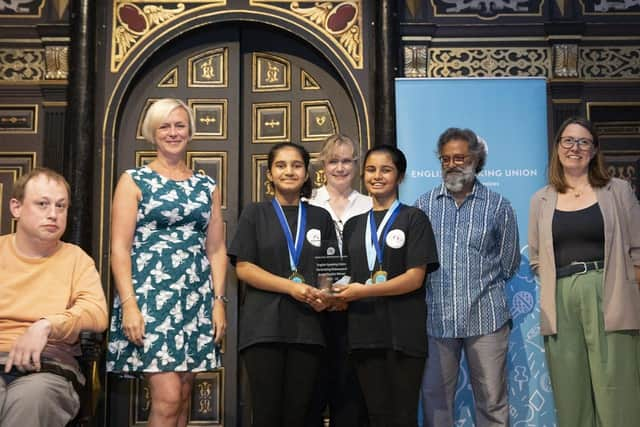Home-schooled students from Eastbourne take the trophy in the ESU Performing Shakespeare Competition


Competing against 11 other regional winners from across England and Wales, the duo’s performance as Hermia and Helena from Act III, scene ii of Shakespeare’s A Midsummer Night’s Dream won them the coveted award.
The runner up was Eli Morris, a Year 8 student at Hitchin Boys’ School for his performance as Jacques (Act II, scene vii) in As You Like It. George Slater and Archie Grace, from The King’s School, Gloucester, won the Don Miller Award, voted for by the audience, for the dramatic stage combat they employed in Act v, scene viii of Macbeth.
Advertisement
Hide AdAdvertisement
Hide AdThe grand final was the culmination of a competition in which over 4,000 children have taken part. Winners from the 12 regional competitions were invited to Shakespeare’s Globe for the occasion, where they received a tour of the theatre and a professionally-led workshop before they took to the stage in the atmospheric Sam Wanamaker Playhouse. After the competition they received feedback from the panel of esteemed judges comprising actor Abigail Cruttenden; theatre director and arts activist Jatinder Verma MBE; RADA-trained actor Neil Hancock; author and Shakespeare specialist Dr. Victoria Sparey; academic and director of multiple theatre companies Rowan Mackenzie; and Director of Education (Learning) at Shakespeare’s Globe, Lucy Cuthbertson.
Dr. Victoria Sparey, chair of judges, said: “We have been blown away by the performances we have seen today. Many of us said we saw something new in a scene or a speech that we know really well – the actors have succeeded in moving the audience and connecting with us to make us think something new.”
Fellow judge Rowan Mackenzie added: “These were amazingly innovative, thoughtful, inspirational performances into which the young people had put a lot of thought and related them to their own experiences and then used that as a vehicle to communicate to the wider world. That to me is the power of Shakespeare.”
The prestigious Performing Shakespeare competition was started 11 years ago by the London branch of the English-Speaking Union working closely with the then Director General, Peter Kyle OBE, a former CEO of Shakespeare’s Globe. The competition now involves hundreds of students each year and covers all areas of England and Wales. Pupils between the ages of 11 and 14 are invited to perform, and explain their choice and artistic presentation of, a monologue or duologue from any of Shakespeare’s texts, helping them to develop their confidence, creativity and ability for self- expression.